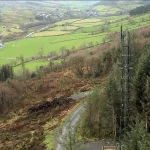UPD Gov Reject BT Voluntary 10Mbps UK Broadband USO and Goes Regulatory
After a final consultation (here) the Government has today revealed its chosen path for implementing a new legally-binding Universal Service Obligation (USO), which promises a minimum broadband download speed of 10Mbps (1Mbps upload) for all by 2020 and rejects BT’s £600m voluntary proposal.
Fixed line “superfast broadband” (24Mbps+) connections are currently estimated to cover around 95% of homes and businesses in the United Kingdom and the Government’s Broadband Delivery UK programme predicts that this could reach 98% by around 2020, which will sadly leave 2% of premises in predominantly rural areas (plus some disadvantaged urban spots) to suffer from slower speeds. This is where the Universal Service Obligation, which is part of the wider Digital Economy Act 2017, should focus.
Ofcom recently estimated that 4% of the UK (1.1 million premises) still cannot receive speeds of 10Mbps+ (here), although the on-going BDUK deployment means that come 2020 this gap should have been reduced to somewhere around 500,000 premises (depending upon chosen USO design).
Advertisement
Catering for the final 2% by delivering universal fixed line superfast broadband coverage would be expensive (estimated at up to £1.4bn) and so our austerity minded Government proposed a slower USO to fill the gap, which pledged to provide an “affordable” connection that can deliver line speeds of at least 10Mbps (i.e. most will get much faster speeds).
Draft 10Mbps USO Design (Subject to Change)
* A minimum download speed of 10Mbps (Megabits per second) and 1Mbps for uploads. The download speed was chosen by Ofcom as being the level needed to meet the requirements of an “average family“.
* Additional quality parameters with minimum standards for latency, a maximum sharing between customers (contention ratio of 50:1) and a data cap of at least 100GB per month.
* Most of the USO will be delivered via existing FTTP and FTTC (VDSL2) based technologies, while fixed wireless and mobile broadband will also likely have a role to play. BT’s original voluntary proposal also indicated that Satellite may have a role for the final 0.3% of extremely remote premises, although the Government has yet to decide.
* A proposed cost threshold of £3,400 per eligible property will continue to apply, although it can now be aggregated so that communities can work together when requesting a better connection (i.e. raising the total aggregated cost threshold to cover an installation of better infrastructure).
The old USO also included this cost threshold, which meant that if a deployment cost more than this then BT or KCOM could require the customer to pay any excess costs plus a standard connection charge (this is all necessary to stop the deployment costs from getting out of control). In that sense no USO will ever be truly “universal“.
* The costs could be met by industry through a cost-sharing mechanism (levy on subscribers?), which will be established by Ofcom once the specification for the USO has been set in secondary legislation.
* The USO will adopt uniform pricing for upfront and ongoing charges. This will aim to ensure that those in areas not currently served would pay no more than those in the rest of the UK.
The current plan is an improvement from the existing USO, which is offered exclusively via fixed lines and only requires KCOM (Hull only) and BT (Openreach) to deliver, following the “reasonable request of any End-user” (i.e. demand-led), a telephone service that includes the ability to offer “data rates that are sufficient to permit functional internet access” (here); even slow dial-up lines qualify for this.
Originally the Government considered adopting BT’s voluntary proposal for a soft USO (closer to a Universal Service Commitment), which would have seen the operator spend up to £600m on the service (here). However Sky Broadband and TalkTalk helped to scupper that idea by threatening a Judicial Review over the fact that BT would seek to recoup their investment by raising wholesale charges, which the ISPs said would force all of their customers to pay more even though only a few would actually benefit.
Elsewhere alternative “full fibre” networks, such as Hyperoptic and Gigaclear, were concerned because it would make their investment case for building new networks into poorly served areas more difficult by allowing BT to reinforce their market position (this is arguably true of both the voluntary BT and mandatory USO options). The Scottish Government also had concerns (here).
Advertisement
Instead the Government has today chosen to impose a regulatory USO, which will give everybody the legal right to request a 10Mbps+ service.
Advantages of a Regulatory USO (Government Points)
* The minimum speed of connection can be increased over time as consumers’ connectivity requirements evolve;
* It provides for greater enforcement to help ensure households and businesses do get connected.
* The scheme will maximise the provision of fixed line connections in the hardest to reach areas.
* Places a legal requirement for high speed broadband to be provided to anyone requesting it, subject to a cost threshold (in the same way the universal service right to a landline telephone works).
A spokesperson for the Government (DCMS) said that, “We did not feel the [BT] proposal was strong enough for us to take the regulatory USO off the table, and have therefore decided not to pursue BT’s proposal in favour of providing a legal right to broadband … the government has decided that regulation is the best way of making sure everyone in the UK can get a decent broadband connection of at least 10Mbps as soon as possible.”
The obvious problem here is that none of the other ISPs have shown any interest in helping to deliver a USO (example) and thus much of it is still likely to fall upon Openreach (BT) across the UK, as well as KCOM in Hull. In practice Openreach may still have to conduct a similar network roll-out to their rejected voluntary proposal in order to meet the expectations, but there’s now a big question mark over funding for it all.
Karen Bradley MP, UK Culture Secretary, said:
“We know how important broadband is to homes and businesses and we want everyone to benefit from a fast and reliable connection. We are grateful to BT for their proposal but have decided that only a regulatory approach will make high speed broadband a reality for everyone in the UK, regardless of where they live or work.
This is all part of our work on ensuring that Britain’s telecoms infrastructure is fit for the future and will continue to deliver the connectivity that consumers need in the digital age.”
A BT Spokesperson said:
“We respect the Government’s decision.
BT and Openreach want to get on with the job of making decent broadband available to everyone in the UK so we’ll continue to explore the commercial options for bringing faster speeds to those parts of the country which are hardest-to-reach.
Alongside this, we’ll work closely with Government, Ofcom and industry to help deliver the regulatory USO. We look forward to receiving more details from the Government outlining its approach to defining the regulatory USO, including the proposed funding mechanism.”
The regulatory implementation is expected to take up to two years from when the Government lays its Order to complete (secondary legislation is now required – due in early 2018 alongside the final design), which is one of the reasons why it won’t be formally enforced until 2020. On top of that it’s important to remember that the UK is a diverse and competitive market with many different suppliers, networks and ISPs, which means that the USO won’t equate to a free and automatic upgrade.
Advertisement
Instead the 10Mbps USO will adopt the same “on request” approach as the original one, which means that users who want a faster than sub-10Mbps connection will need to upgrade to a relevant USO supporting service in order to benefit (note: faster services tend to cost a little more but then there’s no such thing as a free lunch). The competitive market also means that an “on request” approach is largely unavoidable.
Elsewhere the Digital Economy Act provides a power for the Government’s Secretary of State to direct Ofcom to review the USO at any time, after consulting the regulator, and for a specific requirement that once 75% of all premises take-up 30Mbps broadband the minimum speed would be reviewed.
In other words it could be a very long time before the USO speed of 10Mbps is reviewed and raised again, although opposition parties have signalled their desire for a 30Mbps USO and so future governments may enhance this approach. As hinted early, the main challenge to a 30Mbps+ USO approach reflects issues of both cost and competition.
Setting the USO, which is supposed to define a minimum not maximum performance level, too high might risk damaging competition by effectively handing one operator a distinct advantage over many smaller rivals (e.g. rebuilding BT’s monopoly at a time when Ofcom and the Government are trying to foster alternative networks). Suffice to say that, for now, 10Mbps is more acceptable.
We should add that the proposed minimum data cap for related connections of 100GB per month may seem like a lot, but it’s not. Ofcom’s data revealed (here) that the average broadband connection already uses 190GB and this will be even higher by 2020. The modern thirst for HD video streaming and related services makes it easy to gobble 100GB, which for those stuck on Satellite could quickly become an expensive roadblock.
Finally, it’s worth pointing out that other EU countries which have adopted a similar USO do not go as high as 10Mbps (e.g. Spain, Belgium and Croatia use 1Mbps, while Finland opted for 2Mbps and Malta is on 4Mbps) and many don’t even have one for broadband, although that could change with future policy (here).
We look forward to seeing the final design and funding arrangements early next year.
UPDATE 10:10am
Some comments have come in.
Dr Charles Trotman, CLA Senior Rural Business Adviser, said:
“The challenges of rolling out fast, reliable and affordable rural broadband are well known but have been recognised by the Government with the commitment to provide a universal service obligation of at least 10 Mbps from 2020.
For too long, rural areas have been at the back of the queue when it comes to investment in infrastructure and that is why this legal principle is not something to compromise on. Rural areas now stand a better chance of receiving a decent broadband service without BT monopolising the market and deciding its own terms for connection.
It is vital for the Government to move as swiftly as possible towards meeting its objective of universal coverage in 2020 and to ensure legal guarantees are set for any future universal obligation. Ten Mbps is only a benchmark minimum speed which is sufficient now but as technology advances could be too slow in just five years’ time.”
Tristia Harrison, TalkTalk CEO, said:
“The Government has made the right decision for consumers. Broadband is increasingly a utility and it is critical that all of society has fast, affordable access. By opting for formal regulation rather than weaker promises, ministers are guaranteeing consumers will get the minimum speeds they need at a price they can afford. The whole industry now needs to work together to ensure customers see the benefits as quickly as possible.”
Matthew Hare, CEO of Gigaclear, said:
“We welcome this decision from the Government to reject BT’s private proposal. The UK needs great broadband – in fact full fibre – for all. To get there, the UK needs a competitive market in fibre networks. As a full fibre provider delivering 1,000Mbps to every property, we know homes and businesses want access to reliable speeds.
We believe that the 10Mbps is a sensible basic threshold, but providers should be given the opportunity to provide faster speeds. We look forward to working with Ofcom and the wider industry in the coming months to design a competitive process that gets the best result for the UK.”
UPDATE 11:25am
Added a comment from BT above.
Mark is a professional technology writer, IT consultant and computer engineer from Dorset (England), he also founded ISPreview in 1999 and enjoys analysing the latest telecoms and broadband developments. Find me on X (Twitter), Mastodon, Facebook, BlueSky, Threads.net and Linkedin.
« Scotland Publish Tender for Universal R100 Superfast Broadband Rollout

















































Comments are closed